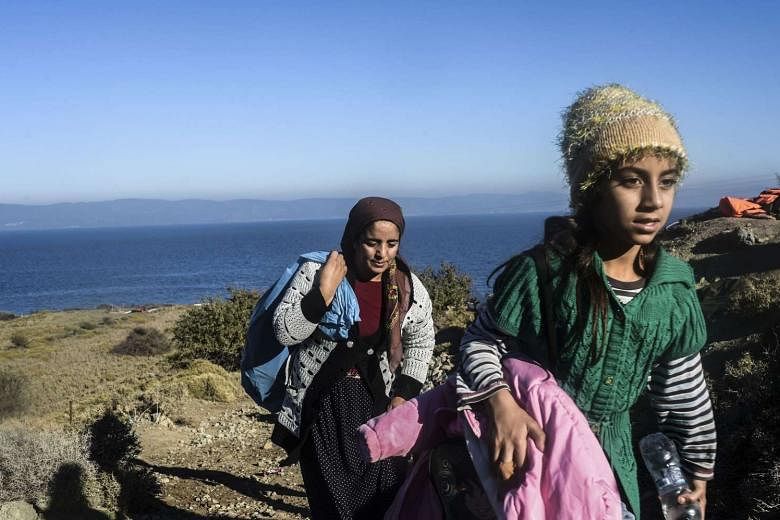WASHINGTON (REUTERS) - Islamic State in Iraq and Syria (ISIS) theologians have issued an extremely detailed ruling on when "owners" of women enslaved by the extremist group can have sex with them, in an apparent bid to curb what they called violations in the treatment of captured females.
The ruling or fatwa has the force of law and appears to go beyond ISIS' previous known utterances on slavery, a leading Islamic State scholar said.
It sheds new light on how the group is trying to reinterpret centuries-old teachings to justify the rape of women in the swaths of Syria and Iraq it controls. For a US government translation of the fatwa click http://graphics.thomsonreuters.com/doc/slaves-fatwa.pdf.
The fatwa was among a huge trove of documents captured by US Special Operations Forces during a raid targeting a top ISIS official in Syria in May.
Reuters has reviewed the document, which has not been previously published, but couldn't independently confirm its authenticity.
Among the fatwa's injunctions are bans on a father and son having sex with the same female slave; and the owner of a mother and daughter having sex with both.
Joint owners of a female captive are similarly enjoined from intercourse because she is viewed as "part of a joint ownership".
The United Nations and human rights groups have accused ISIS of the systematic abduction and rape of thousands of women and girls as young as 12, especially members of the Yazidi minority in northern Iraq.
Many have been given to fighters as a reward or sold as sex slaves.
Far from trying to conceal the practice, ISIS has boasted about it and established a department of "war spoils" to manage slavery.
Reuters reported on the existence of the department on Monday.
In an April report, Human Rights Watch interviewed 20 female escapees who recounted how Islamic State fighters separated young women and girls from men and boys and older women.
They were moved "in an organised and methodical fashion to various places in Iraq and Syria".
They were then sold or given as gifts and repeatedly raped or subjected to sexual violence.
DOS AND DON'TS
Fatwa No. 64, dated Jan 29, 2015, and issued by ISIS' committee of research and fatwas, appears to codify sexual relations between ISIS fighters and their female captives for the first time, going further than a pamphlet issued by the group in 2014 on how to treat slaves.
The fatwa starts with a question: "Some of the brothers have committed violations in the matter of the treatment of the female slaves. These violations are not permitted by Sharia law because these rules have not been dealt with in ages. Are there any warnings pertaining to this matter?"
It then lists 15 injunctions, which in some instances go into explicit detail.
For example: "If the owner of a female captive, who has a daughter suitable for intercourse, has sexual relations with the latter, he is not permitted to have intercourse with her mother and she is permanently off limits to him. Should he have intercourse with her mother then he is not permitted to have intercourse with her daughter and she is to be off limits to him."
ISIS' rape of female captives has been well documented, but a leading ISIS expert at Princeton University, Cole Bunzel, who has reviewed many of the group's writings, said the fatwa went beyond what has previously been published by the militants on how to treat female slaves.
"It reveals the actual concerns of ISISslave owners," he said in an e-mail.
Still, he cautioned that not "everything dealt with in the fatwa is indicative of a relevant violation. It doesn't mean father and son were necessarily sharing a girl. They're at least being 'warned' not to. But I bet some of these violations were being committed."
The fatwa also instructs owners of female slaves to "show compassion towards her, be kind to her, not humiliate her, and not assign her work she is unable to perform."
An owner should also not sell her to an individual whom he knows will mistreat her.
Professor Abdel Fattah Alawari, dean of Islamic Theology at Al-Azhar University, a 1,000-year-old Egyptian centre for Islamic learning, said ISIS "has nothing to do with Islam" and was deliberately misreading centuries-old verses and sayings that were originally designed to end, rather than encourage, slavery.
"Islam preaches freedom to slaves, not slavery. Slavery was the status quo when Islam came around," he said.
"Judaism, Christianity, Greek, Roman, and Persian civilisations all practiced it and took the females of their enemies as sex slaves. So Islam found this abhorrent practice and worked to gradually remove it."
In September 2014, more than 120 Islamic scholars from around the world issued an open letter to ISIS leader Abu Bakr al-Baghdadi, refuting the group's religious arguments to justify many of its actions.
The scholars noted that the "reintroduction of slavery is forbidden in Islam."

